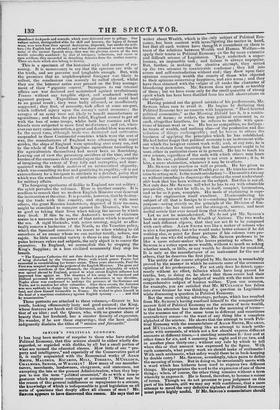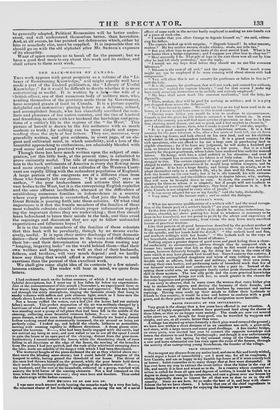SENIOR'S POLITICAL ECONOMY.
IT has long been matter of surprise to those who have studied Political Economy, that this science should be either wholly dis- regarded, or regarded with dislike, by all but a small portion of what are termed the educated classes. How little of our " pro- perty and intelligence," and especially of the Conservative part of it, is really acquainted with the Economical works of ADAM SMITH, MALTHUS, RICARDO, MILL, TORRENS, MCULLOCH, CHALMERS, SENIOR, Or WHATELY! How many of our manufac- turers, merchants, landowners, clergymen, and statesmen, not excepting the late or the present Administration, when they hap- pen to use the term " political economist," do so with a tone or gestures which express contempt or animosity What can be the reason of this general indifference or repugnance to a science, the knowledge of which is indispensable togood legislation on all sorts of questions that deeply affect all classes of men ? Mr. SENIOR appears to have discovered this reason. He says that no
writer about Wealth, which is the only subject of Political Eco- nomy, has been content with investigating the matter in hand, but that all such writers have thought it incumbent on them to
treat of the relations between Wealth and Human Welfare—to apply their tenets in Political Economy t`o the far more extensive
and difficult science of Legislation. They undertook a super- human, an impossible task ; and failure is always unpopular. But, further, in making the abortive atisempt, they mixed up the two sciences in inextricable confusiots ; they fell into
errors and self-contradiction without end; they drew upon their opinions concerning wealth the enmity of those who objected to their opinions concerning happiness, and vice versa ; and they
have thus obtained with the vulgar of all ranks the character of blundering pretenders. Mr: SENIOR does not speak so harshly of them ; but we have room only for the small quantity of strong spirit which has here been distilled from his mild observations on the subject. Having pointed out the grand mistake of his predecessors,- Mr. SENIOR takes care to avoid it. He begins by declaring that Political Economy has no concern with happiness. " Hard-hcarted
political economists," as the Morning Herald has it, is a contra- diction of terms ; or rather, the true political economist is, as such, altogether heartless, for he refuses to meddle with ques-
tions of human weal or wo. He has no sympathies, no feelings : he treats of wealth, and nothing else—of the production and dis- tribution Cf ""g. exchangeable ; and he leaves to others the
business of applying the principles which he has established. He had better forget that political economy is an instrument with-
out which the lawgiver cannot work well; and, at any rate, he is bored to abstain from inquiring how that instrument ought to be user, either in particular cases or in general. He has to teach his
own science, regardless of the ends with which others may learn it. In his view, political economy is not even a means ; it is, to him, a mere abstraction, whatever it may be to others. Mr. SENIOR can practise as well as preach. He has given us a treatise—the only treatise on Wealth per se. He tries his own doc-
trine by acting on it. Is the result satisfactory ?—The result is (we say
so without intending to disparage the others) the most understand- able book that has been written on the subject. But this is not all.
Not only does Mr. SENIOR tell what he has to say with admirable perspicuity, but what he tells is, in itself, compact, harmonious, and so far as it goes, complete. His mode of explaining is supe- rior; the explanation itself excellent. Disencumbering his subject of all that is foreign to it—confining himself to a single purpose—acting strictly on the principle of the Division of Em- ploy ments—he has turned out the strongest, neatest, and most useful article that ever issued from that workshop.
Let us not be misunderstood. We do not put Mr. SENton's book in comparison with the Wealth of Nations. The two works had such different objects, that they are not fit to be compared with each other. ADAM SMITH was like a maker of colours who is also a fine painter, but who would make better colours if he did nothing else, or paint far finer pictures if his colours were pre- pared by one who did nothing else. Mr. SENIOR professes to be like a mere colour-maker who leaves painting to others. Mr. SENIOR is a writer upon mere wealth, without so much as asking whether much, or little, or any wealth be desirable for mankind. It is only as the manufacturer of an instrument for the use of others, that he deserves the first place. The utility of the course adopted by Mr. SENIOR iS remarkably proved by the manner in which he corrects some of the erroneous opinions of his predecessors. For not only does he detect, appa- rently without an effort, fallacies which have long passed for truths, but, in doing so, he shows that those errors had their origin in confounding the subject of wealth with the much more comprehensive subject of human welfare. Upon one occasion, for example, you are satisfied that Mr. M'CULLOCH has fallen into error because lie was thinking of a question in Legislation while discussing a question in Political Economy. But the most striking advantage, perhaps, which has resulted from Mr. SENIOR'S having confined himself to the comparatively narrow field of Political Economy as the science of mere wealth, is that his attention has been devoted to the meaning of terms— to the common use of the same term in different and sometimes contradictory senses—to the want of any thing like a complete alphabet of the science. He shows that the attempt to teach Poli- tical Economy with the nomenclature of ADAM SMITH, RICARDO, and M'CuLnoen, is something like an attempt to teach arith- metic with numerals, of which not a few should express different amounts at different times,-4 standing sometimes fez four and at other times for six, and 6 meaning here eight and there two, and in another place thirty-one ; without any rule by which to tell when this or that amount was expressed by the figure. With such numerals, what pretty work we should make of arithmetic! With such arithmetic, what safety would there be in book-keeping by double entry ? Mr. SENIOR, accordingly, takes pains to define the meaning of terms. But in doing so, he occasionally meets with a word which has hitherto been used to express two different things. He appropriates the word to the expression of one of those things; when, of course, the other thing remains without a term whereby to express it. He is forced, therefore, to become a coiner of terms. Though we do not presume to pass judgment on this part of his labours, still we may say with confidence, that a mere attempt to mend the very defective alphabet of Political Economy must prove highly useful. If Mr. SENIOR'S nomenclature should be generally adopted, Political Economists will be better under- stood, and will understand themselves better, than heretofore. And, at all events, he has pointed out deficiencies which, either by him or somebody else, must be supplied. It is impossible that we should go on with the old alphabet after Mr. SENIOR'S exposure of its absurdity.
Want of space compels us to break off for the present; but we have a good deal more to say about this work and its author, and shall return to them next week.































 Previous page
Previous page